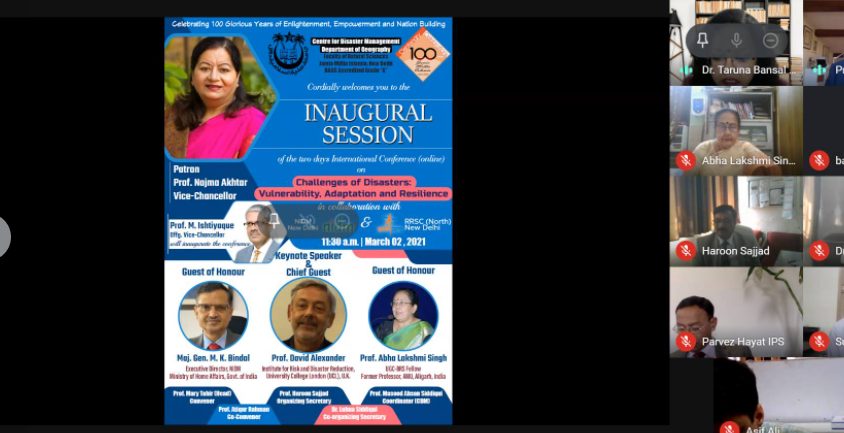
The Centre for Disaster Management, Department of Geography, Jamia Millia Islamia(JMI) organised an International Conference (online) on “Challenges of Disasters: Vulnerability, Adaptation and Resilience” in collaboration with National Institute of Disaster Management, New Delhi and Regional Remote Sensing Centre (North), New Delhi during 02-03 March, 2021. Prof. M. Ishtiyaque, Officiating Vice Chancellor,JMI inaugurated the conference on 2nd March. In his inaugural address he focused on the havoc created by disasters impacting social, economic and ecological spheres and stressed on the need to focus on mitigation and adaptation to disasters through disaster risk management, cooperation between government and citizens and sane policy.
Prof. Taruna Bansal conducted the inaugural session and the welcome address was delivered by Prof. M.A. Siddiqui, Coordinator, Centre for Disaster Management who gave a peek into the Centre of Disaster Management, its functioning and achievements, placements and internships of students. Prof. Haroon Sajjad, Organizing Secretary introduced the theme of the conference.
A total of 167 abstracts were received from countries like the USA, the UK, Iran, Bangladesh, Sri Lanka etc. and from all across India. The Guest of Honor, Major General M.K. Bindal, Executive Director, NIDM delivered an enlightening address on the vulnerability posed by disasters and referred to the SENDAI Framework and the 10 Point Agenda by Prime Minister Shri. Narendra Modi Ji for paying heed to disaster management at the local level.
Prof. Abha Lakshmi Singh, AMU, the other Guest of Honor chose to speak on the disasters associated with the mountains which she termed “Call of the Mountains”. She focused on the disasters in Uttarakhand, the 2013 Himalayan Tsunami and the recent catastrophe in February, 2021 and said that disasters are chain reaction events. Prof. David Alexander, University College London, U.K. was the Chief Guest and delivered the keynote address on “Disaster Risk Reduction and the Impact of COVID-19”wherein he discussed the challenges and threats posed by COVID-19 and called it the “mother of all cascading events/disasters”.
Various COVID-19 associated sub-topics were discussed right from the transmission of the disease till the vaccination strategies. It reflected as to how COVID-19 did not just break the regular system of working but also revealed an already broken system and thereby, highlighted the aggravating gaps between the rich and the poor. Prof. Mary Tahir, Convener delivered the Vote of Thanks and acknowledged the time and efforts invested by all for the success of the conference.
The organizers thanked (in absentia) the Vice-Chancellor, JMI, Prof. Najma Akhter for giving them the opportunity to conduct this international conference. They duly acknowledged her help and guidance in making this conference a successful one.Special lectures were organised as one of the technical sessions in the International Conference.
Proceedings of the session was conducted by Prof. Haroon Sajjad, Organizing Secretary of the conference. The session was chaired by Dr. S.D. Attri, Additional Director General, IMD. Prof. Surya Parkash, NIDM, delivered a lecture on “Community based disaster risk reduction and resilience”. He focused on how the community can play an active role in managing disasters.
He emphasized the role of local governance, use of techniques and creation of community level awareness. The second lecture was delivered by Dr. Md. Nazrul Islam, Jahangir University, Dhaka, Bangladesh on “Modeling on Toxic Algae Bloom Mechanisms in Aquatic Ecosystem and Silent Disasters of Water Crisis in Asian Countries”. He stressed on the need to be aware regarding a “silent disaster”- algae bloom as it is emerging as one of the lethal events. He also presented case studies which provided a practical outlook of the issue.
Dr. Alexander Follmann, University of Cologne, Germany delivered a lecture on “Challenges and risks of urban river fronts – the case of Yamuna in Delhi” wherein he stressed on the vulnerability that the Yamuna floodplains faced specifically due to anthropogenic activities. He showed the stark difference in the level of pollution between the entrance and exit of the Yamuna in the national capital. This problem occurs mainly as the Nazafgarh drain along with 20 more drains pollute the river, coupled with high density areas and development projects along the river.
Moreover, most of east Delhi lies on the Yamuna floodplains. He concludes by urging people and authorities not to carry out any further construction in the floodplains.Prof. Haroon Sajjad, Organizing Secretary concluded the session by giving his warmest thanks and gratitude to the chair and speakers.


.jpg)